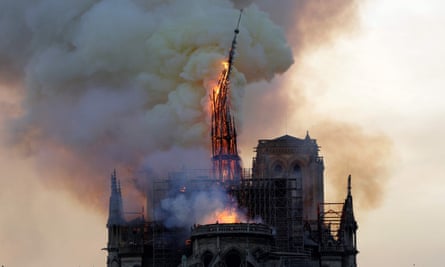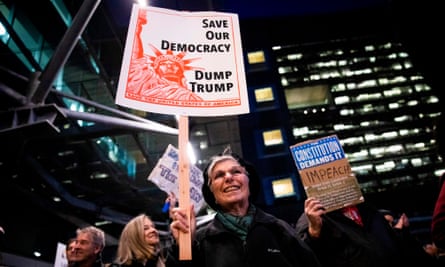It was a year of high anxiety – but unlike the Mel Brooks movie of that name, there was not a lot to laugh about. Nerves were frayed by worries about a Middle East conflagration, the destructive antics of a narcissistic US president and an accelerating climate emergency.
Too many rulers forgot their job was to serve the ruled, not kill, repress, rob or bamboozle them. The idea of multilateral cooperation and international law took another beating. Division, separation and isolation were recurring themes in a global landscape scarred by fear.
Yet there were sparks of hope and positive energy. Many countries saw large-scale popular protests against corrupt, undemocratic regimes, some of which were toppled. Elsewhere, voter revolts shattered the complacency of “mainstream” parties, unsettling entrenched elites.
Younger people fiercely challenged the toxic generational legacy of inequality, debt and pollution. A 16-year-old Swede, Greta Thunberg, emerged as an inspirational leader, travelling by sea to the UN in New York to confront world leaders. Extinction Rebellion emerged as controversial shock troops of a hoped-for green revolution.
But in poorer countries, life chances were again limited by a basic lack of security; safe food and water; education; jobs; civil, religious and gender rights, and freedom to travel. These handicaps were chronically disempowering, precluding meaningful political and social advances.
In a year when The Scream, Edvard Munch’s unnerving masterpiece, went on show in Brexit-stricken Britain, there were reasons to be cheerful and plenty more to be fearful. For many people, 2019 was a year of jarring uncertainty – 12 months spent living on edge.
The Danes raised what was perhaps the biggest cheer of the year when they bluntly told Donald Trump where he could put his importunate bid to “buy” Greenland. The US president reacted by cancelling a long-planned state visit to Copenhagen in a fit of pique, thereby saving Queen Margrethe the bother of pretending he was welcome.
The Greenland imbroglio shone a timely light on alarming US, Russian and Chinese plans to exploit the resource-rich Arctic region with scant regard for the environmental impact. After US officials objected to any mention of the climate emergency, an Arctic Council summit ended in disarray. But indigenous communities and supporters pushed back.
Europe survives the flames
France experienced what some believed was a miraculous national reprieve in April when the roof and spire of Notre Dame cathedral caught fire. As president Emmanuel Macron and most of Paris looked on aghast, the famous old building appeared doomed. But firefighters, helped by an almighty slice of good luck, saved most of the medieval structure.

Europe as a whole survived another symbolic conflagration when a predicted surge in backing for far-right populist, xenophobic and ultra-nationalist parties mostly failed to materialise in elections for the European parliament in 28 countries. Immigration proved a less inflammatory issue than expected.
What the voting showed instead was increased dissatisfaction with politics as usual, with support shifting from traditional, centrist parties of left and right to smaller parties such as the Greens. Hardline groups such as France’s National Rally (National Front) and Germany’s AfD did well. But there was no breakthrough.
Political developments in Italy provided further encouragement for European progressives after Matteo Salvini, fire-breathing leader of the far-right nationalist League, was out-manoeuvred by coalition rivals. Salvini lost his post as interior minister, where he had wrought havoc with the EU’s policy on migrants.
The possibly temporary eclipse of Salvini, touted as a future leader of a hypothetical united front linking far-right groups from Poland to the Netherlands, had EU-wide significance. That ugly scheme is on ice for now. Awareness of racism and sexism in sports such as football grew, and tolerance for it diminished, at least in theory. In Finland, a Social Democrat, Sanna Marin, 34, became the world’s youngest serving prime minister.
America resists Trump
In the US, Donald Trump dominated the headlines for much of the year, using the White House bully pulpit to position himself for a 2020 re-election bid. Ranged against him was a politically diverse group of Democratic presidential hopefuls, including the left-leaning Elizabeth Warren and Bernie Sanders, moderate centrist Joe Biden and the surprise Iowa front-runner, Pete Buttigieg.
Many Americans continued to support Trump – his average approval rating hovered around 41% – but this figure was low, historically speaking, feeding optimism he could be beaten. Trump again proved his own worst enemy with inept and offensive responses to a series of mass shooting incidents, extreme weather events and renewed accusations that he had sexually abused women.
Federal courts intervened to stay Trump’s bid to deport hundreds of thousands of undocumented immigrants, known as the Dreamers, who arrived in the US as children. He also attracted criticism for the mass detention of Central American asylum-seekers on the US-Mexico border.

But the most serious damage was inflicted in Washington. First came the highly critical, albeit inconclusive, report by Robert Mueller into an alleged Trump campaign conspiracy with Russia to interfere in the 2016 election. Mueller refused to exonerate Trump and later testified the president had told untruths to his investigation.
Then came Trump’s December impeachment in the House of Representatives, sparked by an anonymous whistleblower and witnesses who suggested Trump tried to induce a foreign state, Ukraine, to help smear Biden, a potential re-election rival. House Democrats advanced articles of impeachment alleging abuse of power and obstruction of Congress. With the public divided and the Senate unlikely to convict, it remains unclear how badly Trump has been hurt.
The year was encouraging for what did not happen, as well as what did. Having reneged on the 2015 Iran nuclear deal to the dismay of its European partners, the US re-imposed and escalated sanctions on Tehran, including a worldwide oil embargo.
When ships and an oilfield were attacked in the Gulf, Washington and Saudi Arabia blamed Iranian forces. But predictions of war between Iran and its tormentors proved premature after Trump called off a retaliatory military strike with minutes to go.
And there was an added bonus – the sacking of John Bolton, Trump’s national security adviser, whose belligerent views influenced Trump’s confrontational approach. Ironically, it was Bolton’s opposition to Trump’s irresponsible on-off Afghanistan peace deal that proved his final undoing.
In east Asia, a breakdown in negotiations between the US and North Korea over American demands that Pyongyang eliminate its nuclear weapons raised concerns about a war drawing in Japan, South Korea and China. But Kim Jong-un, North Korea’s dictator, offered a temporary reprieve by suspending atomic bomb and long-range missile tests. A new crisis was brewing by year’s end.
Happily, the dread prospect of nuclear confrontation between India and Pakistan was also avoided. After Indian troops died in a suicide bombing blamed on Pakistan-backed militants, Indian fighter jets crossed the line of control into Pakistan-administered Kashmir in March. Sporadic clashes ensued – but calm was eventually restored.
The people stand up
In Syria, the so-called caliphate declared by Islamic State (Isis) terrorists in 2014 was finally destroyed with the fall in February of Baghuz, their last stronghold. In October, the Isis leader, Abu Bakr al-Baghdadi, was killed in a raid by US special forces, assisted by the Kurds. The year saw an overall reduction in Isis terror attacks.
A growing intolerance among ordinary citizens for corrupt, oppressive and incompetent rulers around the world was another encouraging feature of 2019. But the unrest also highlighted two negative trends: the willingness of governments to use extreme force to keep control, as seen in Egypt, Iran, Iraq, Russia, and Hong Kong and the frailty of democratic institutions when subverted by the powerful.

Younger generations were in the forefront of protests in Chile, Peru, Haiti, Venezuela, Pakistan, Zimbabwe, South Africa, Tunisia and elsewhere that primarily focused on economic inequalities and political malfeasance. Some brought decisive change.
Amid joyful celebrations, the people of Sudan succeeded in ousting the country’s longtime dictator, Omar al-Bashir, and cutting a power-sharing deal with the army and the feared Janjaweed militia. In Algeria, another veteran president, Abdelaziz Bouteflika, was toppled, although the ruling elite clung on. Even Recep Tayyip Erdoğan, Turkey’s modern sultan, had his wings clipped when his Truth and Justice party lost prestigious mayoral elections in Istanbul and Ankara.
In Lebanon, the prime minister, Saad Hariri – seen as a symbol of the country’s self-serving, wealthy elite – was forced to resign. Malta’s prime minister, Joseph Muscat, promised to stand down as investigators, newly energised by European pressure, appeared to close in on the killers of the investigative journalist, Daphne Caruana Galizia.
And from east Africa came a story that typified how pockets of genuine light continue to permeate the gloom. Ethiopia, whose recent history has been marred by famine and conflict, provided one of the year’s best “good news” stories. Its prime minister, Abiy Ahmed, author of ground-breaking domestic reforms, was awarded the 2019 Nobel peace prize for ending the long-running conflict with Eritrea.
